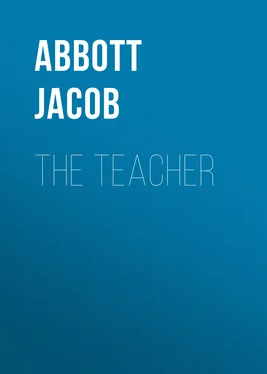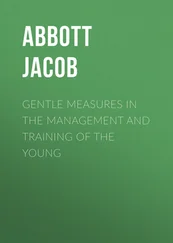Jacob Abbott - The Teacher
Здесь есть возможность читать онлайн «Jacob Abbott - The Teacher» — ознакомительный отрывок электронной книги совершенно бесплатно, а после прочтения отрывка купить полную версию. В некоторых случаях можно слушать аудио, скачать через торрент в формате fb2 и присутствует краткое содержание. Жанр: foreign_edu, pedagogy_book, на английском языке. Описание произведения, (предисловие) а так же отзывы посетителей доступны на портале библиотеки ЛибКат.
- Название:The Teacher
- Автор:
- Жанр:
- Год:неизвестен
- ISBN:нет данных
- Рейтинг книги:5 / 5. Голосов: 1
-
Избранное:Добавить в избранное
- Отзывы:
-
Ваша оценка:
- 100
- 1
- 2
- 3
- 4
- 5
The Teacher: краткое содержание, описание и аннотация
Предлагаем к чтению аннотацию, описание, краткое содержание или предисловие (зависит от того, что написал сам автор книги «The Teacher»). Если вы не нашли необходимую информацию о книге — напишите в комментариях, мы постараемся отыскать её.
The Teacher — читать онлайн ознакомительный отрывок
Ниже представлен текст книги, разбитый по страницам. Система сохранения места последней прочитанной страницы, позволяет с удобством читать онлайн бесплатно книгу «The Teacher», без необходимости каждый раз заново искать на чём Вы остановились. Поставьте закладку, и сможете в любой момент перейти на страницу, на которой закончили чтение.
Интервал:
Закладка:
The legislative power was vested in the hands of a general committee, consisting of eight or ten, chosen by the students from their own number. They met about once a week to transact such business as appointing officers, making and repealing regulations, and inquiring into the state of the Lyceum. The Instructers had a negative upon all their proceedings, but no direct and positive power. They could pardon, but they could assign no punishments, nor make laws inflicting any.
Now such a plan as this may succeed for a short time, and under very favorable circumstances; and the circumstance, which it is chiefly important should be favorable, is, that the man who is called to preside over such an association, should possess such a share of generalship , that he can really manage the institution himself , while the power is nominally and apparently in the hands of the boys. Should this not be the case, or should the teacher, from any cause, lose his personal influence in the school, so that the institution should really be surrendered into the hands of the pupils, things must be on a very unstable footing. And accordingly where such a plan has been adopted, it has, I believe, in every instance, been ultimately abandoned.
Real self-government is an experiment sufficiently hazardous among men; though Providence, in making a daily supply of food necessary for every human being, has imposed a most-powerful check upon the tendency to anarchy and confusion. Let the populace of London materially interrupt the order, and break in upon the arrangements of the community, and, in eight and forty hours, nearly the whole of the mighty mass will be in the hands of the devourer, hunger; and they will be soon brought to submission. On the other hand, a month's anarchy and confusion in a college or an academy, would be delight to half the students, or else times have greatly changed, since I was within college walls.
Although it is thus evident that the important concerns of a literary institution cannot be safely committed into the hands of the students, very great benefits will result from calling upon them to act upon, and to decide questions relative to the school, within such limits, and under such restrictions, as may appear best. Such a practice will assist the teacher very much, if he manages it with any degree of dexterity: for it will interest his pupils in the success of the school, and secure, to a very considerable extent, their cooperation. It will teach them self-control and self-government, and will accustom them to submit to the majority,—that lesson, which, of all others, it is important for a republican to learn.
In endeavoring to interest the pupils of a school in the work of cooperating with the teacher in its administration, no little dexterity will be necessary, at the outset. In all probability, the formal announcement of this principle, and the endeavor to introduce it, by a sudden revolution, would totally fail. Boys, like men, must be gradually prepared for power, and they must exercise it only so far as they are prepared. This however can, very easily, be done. The teacher should say nothing of his general design, but when some suitable opportunity presents, he should endeavor to lead his pupils to cooperate with him, in some particular instance.
For example, let us suppose that he has been accustomed to distribute the writing-books with his own hand, when the writing hour arrives, and that he concludes to delegate this simple business, first, to his scholars. He accordingly states to them, just before the writing exercise of the day on which he proposes the experiment, as follows.
"I have thought that time will be saved, if you will help me distribute the books, and I will accordingly appoint four distributors, one for each division of the seats, who may come to me, and receive the books and distribute them, each to his own division. Are you willing to adopt this plan?"
The boys answer, "Yes sir," and the teacher then looks carefully around the room, and selects four pleasant and popular boys,—boys who, he knows, would gladly assist him, and who would, at the same time, be agreeable to their school mates. This latter point is necessary, in order to secure the popularity and success of the plan.
Unless the boys are very different from any I have ever met with, they will be pleased with the duty thus assigned them. They will learn system and regularity by being taught to perform this simple duty in a proper manner. After a week, the teacher may consider their term of service as having expired, and thanking them, in public for the assistance they have rendered him, he may ask the scholars, if they are willing to continue the plan, and if the vote is in favor of it, as it unquestionably would be, each boy probably hoping that he should be appointed to the office, the teacher may nominate four others, including perhaps upon the list, some boy popular among his companions, but whom he has suspected to be not very friendly to himself or the school. I think the most scrupulous politician would not object to securing influence, by conferring office in such a case. If any difficulties arise from the operation of such a measure, it can easily be dropped, or modified. If it is successful, it may be continued, and the principle extended, till it very considerably modifies all the arrangements, and the whole management of the school.
Or let us imagine the following scene to have been the commencement of the introduction of the principle of limited self-government, into a school.
The preceptor of an academy was sitting at his desk, at the close of school, while the pupils were putting up their books and leaving the room; a boy came in with angry looks, and, with his hat in his hands bruised and dusty, advanced to the master's desk, and complained that one of his companions had thrown down his hat upon the floor, and had almost spoilt it.
The teacher looked calmly at the mischief, and then asked how it happened.
"I don't know sir; I hung it up on my nail, and he pulled it down."
"I wish you would ask him to come here," said the teacher. "Ask him pleasantly."
The accused soon came in, and the two boys stood together before the master.
"There seems to be some difficulty between you boys, about a nail to hang your hats upon. I suppose each of you think it is your own nail."
"Yes sir," said both the boys.
"It will be more convenient for me to talk with you about this to-morrow, than to-night, if you are willing to wait. Besides, we can examine it more calmly, then. But if we put it off till then, you must not talk about it in the meantime, blaming one another, and keeping up the irritation that you feel. Are you both willing to leave it just where it is, till to-morrow, and try to forget all about it till then? I expect I shall find you both a little to blame."
The boys rather reluctantly consented. The next day the master heard the case and settled it, so far as it related to the two boys. It was easily settled in the morning, for they had had time to get calm, and were, after sleeping away their anger, rather ashamed of the whole affair, and very desirous to have it forgotten.
That day, when the hour for the transaction of business came, the teacher stated to the school, that it was necessary to take some measures to provide each boy with a nail for his hat. In order to show that it was necessary, he related the circumstances of the quarrel which had occurred the day before. He did this, not with such an air and manner as to convey the impression that his object was to find fault with the boys, or to expose their misconduct, but to show the necessity of doing something to remedy the evil, which had been the cause of so unpleasant an occurrence. Still, though he said nothing in the way of reproach or reprehension, and did not name the boys, but merely gave a cool and impartial narrative of the facts,—the effect, very evidently, was to bring such quarrels into discredit. A calm review of misconduct, after the excitement has gone by, will do more to bring it into disgrace, than the most violent invectives and reproaches, directed against the individuals guilty of it.
Читать дальшеИнтервал:
Закладка:
Похожие книги на «The Teacher»
Представляем Вашему вниманию похожие книги на «The Teacher» списком для выбора. Мы отобрали схожую по названию и смыслу литературу в надежде предоставить читателям больше вариантов отыскать новые, интересные, ещё непрочитанные произведения.
Обсуждение, отзывы о книге «The Teacher» и просто собственные мнения читателей. Оставьте ваши комментарии, напишите, что Вы думаете о произведении, его смысле или главных героях. Укажите что конкретно понравилось, а что нет, и почему Вы так считаете.












